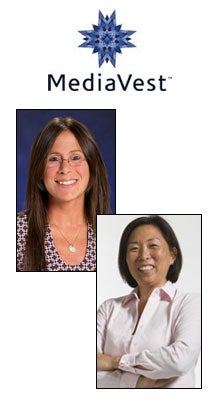 Publicis MediaVest svp, director of publisher investment and activation, Robin Steinberg, and Sarah Baehr, svp, director of digital publishing solutions, discussed transformation occurring at their agency which serves the magazine publisher world and how digital is impacting that strategy. Baehr was recently hired by MediaVest after spending six years at digital agency Razorfish as head of media planning and buying operations among other agency roles.
Publicis MediaVest svp, director of publisher investment and activation, Robin Steinberg, and Sarah Baehr, svp, director of digital publishing solutions, discussed transformation occurring at their agency which serves the magazine publisher world and how digital is impacting that strategy. Baehr was recently hired by MediaVest after spending six years at digital agency Razorfish as head of media planning and buying operations among other agency roles.
AdExchanger.com: Tell us about the strategic changes going on at your agency.
Robin Steinberg: It starts with the transformation going on at the publishing houses where publishers are recognizing that their content can be produced and distributed on many different platforms serving many different types of experiences -and giving the consumer choice and control.
With that, we recognize that we couldn’t use the same approach or process that we have in the past and we needed to partner with publishers in a more holistic, 360 way.
It’s really about a content strategy – depending on who the client is and what objectives we need to fulfill for them – and making sure that we deliver to the right audience on a more precise targeted basis across platforms.
AdExchanger.com: Sarah, what do you see as the unique opportunity for reaching the right audience in digital for publishers? Social media, for example?
Sarah Baehr: I think the great thing about social is that there is no one thing. Facebook is important. Twitter is important. Being able to dig up your content in a smart way is important. And that’s all about being where your consumers are in a way that makes sense.
It’s about knowing your audience well, knowing the value of the brand and the content you’re developing, and making sure that you’re delivering it in the right way at the right time in the way that your audience expects to see it.
Robin Steinberg: I also think that publishers are embracing or recognizing technology as their friend, not their foe, and has great value in addition to the traditional way in which publishers approach distribution. Part of the reason why we brought Sarah on board is to help create these types of approaches.
AdExchanger.com: Is data‑driven media more on your minds today?
Robin Steinberg: From a digital perspective, being able to precisely target what you’re going after with the use of data is critical. But I think that we can’t lose sight of art and science, and there’s still a lot of art that needs to be developed along with the science, which is part of the communications planning architecture that we’re trying to build here.
AdExchanger.com: What do you think some of the biggest misconceptions are among magazine publishers today regarding digital?
Robin Steinberg: I think that because magazine publishers think they are smaller in scale today, they are not as important or as valuable. In fact, I would argue that their content has, in some areas, higher levels of engagement.
Sarah Baehr: And one of the things that we identify is similar to the idea of an ad network and the scale and opportunity it provides. Publishers like a Time Inc. or Conde Nast – if you look at all the opportunities and channels they have to reach an audience – it gives them a tremendous amount of scale embedded in beautiful, curated content to deliver a message in a story fashion.
AdExchanger.com: Looking at media today, and if you were just starting out, what would you do to prepare yourself for a successful career knowing what you know today?
Robin Steinberg: It’s about mindset. The traditional mindset coming into media is very linear, and about becoming an expert in one thing such as TV or broadcast, radio, print, out‑of‑home, etc. Today, as digital has really transformed the media landscape, looking at it more holistically is how I would prepare myself.
Don’t think of it in silos, but think of it more as content distribution, and how the consumer engages with that content based on experience, and what value that brings.
By John Ebbert










